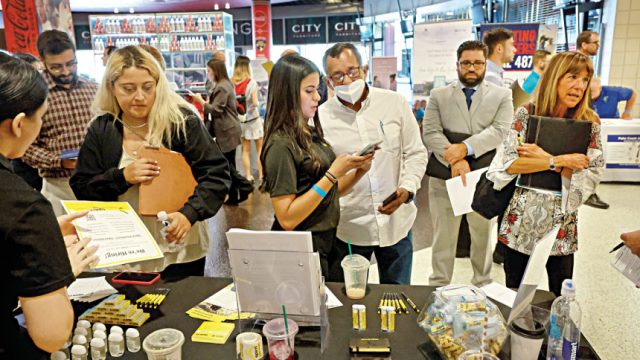US employers hired more workers in September, while the unemployment rate dropped to 3.5 percent, pointing to a tight labor market that kept the Federal Reserve on its aggressive monetary policy tightening campaign for a while. Though the 0.2 point decline in the jobless rate from 3.7 percent in August was partly because of people leaving the workforce, the Labor Department’s closely watched employment report on Friday also showed fewer Americans working part-time for economic reasons last month. Despite the Fed’s stiff interest rate hikes, the labor market continues to show resilience. The article is about US Labor Market Forged Ahead.
“The labor market isn’t just rolling along; it’s a virtual steam-roller that does nothing to slow economic demand and help the Fed in its inflation fight,” said Christopher Rupkey, chief economist at FWDBONDS in New York. Nonfarm payrolls increased by 263,000 jobs last month after rising by an unrevised 315,000 in August, the survey of establishments showed. Job growth has averaged 420,000 per month this year, down from the monthly average of 562,000 in 2021.
Economists polled by Reuters had forecast 250,000 job gains, with estimates ranging from as low as 127,000 to as high as 375,000. The unemployment rate was forecast to remain unchanged at 3.7 percent. The leisure and hospitality industry led to a general increase in employment, where payrolls increased by 83,000 jobs. The bulk of the gains was at restaurants and bars. Still, leisure and hospitality employment remain 1.1 million jobs below its pre-pandemic level.
Healthcare added 60,000 jobs in September, returning employment in the sector back to its pre-pandemic level. Employment in the professional and business services industry increased by 46,000 jobs. Manufacturing added 22,000 jobs, while construction created 19,000 positions, despite the housing market being hammered by the higher borrowing costs.
There were also gains in wholesale trade employment, but the financial activities industry shed 8,000 jobs. The transportation and warehousing sector also lost 8,000 jobs. US stocks opened lower. The dollar rose against a basket of currencies. US Treasury prices fell. The labor market’s resilience has been attributed to a reluctance by businesses to lay off workers following difficulties hiring in the past year as the Covid-19 pandemic forced some people out of the workforce, partly due to prolonged illness caused by the virus.
While government data this week showed job openings dropped by 1.1 million, the largest decline since April 2020, to 10.1 million on the last day of August, there are still 4 million more vacancies than unemployed Americans. In addition, an Institute for Supply Management survey on Wednesday also showed several services industries reporting labor shortages in September.
But with the headwinds from higher borrowing costs and slowing demand rising, economists expect companies will significantly pull back on hiring, with negative payrolls likely next year.
Economists say businesses have been backfilling open positions as they struggled to expand headcount to match the increased demand for their products, driving up job gains. In addition, the US central bank has hiked its policy rate from near-zero at the beginning of this year to the current range of 3.00 percent to 3.25 percent, and last month, more large increases were on the way this year. September’s consumer price report next Thursday will also help policymakers to assess their progress in the battle against inflation ahead of their November 1-2 policy meeting.
Financial markets have almost priced in a fourth 75-basis points rate increase at that meeting, according to CME’s FedWatch Tool. In addition, the household survey from which the unemployment rate is derived showed that 57,000 people left the labor force last month. As a result, the labor force participation rate, or the proportion of working-age Americans who have a job or are looking for one, slipped to 62.3 percent from 62.4 percent in August.
The number of people working part-time for economic reasons dropped 306,000 to 3.8 million last month. With the labor market still tight, wage gains remained solid. Average hourly earnings increased by 0.3 percent after a similar rise in August. That lowered the annual increase in wages to 5.0 percent from 5.2 percent in August. The Atlanta Fed’s wage tracker, which controls for compositional effects like skill level, occupation, and geography, is running above 6 percent. The average workweek was unchanged at 34.5 hours for the fourth straight month.
To read more Financial news, Please Click Here!





















